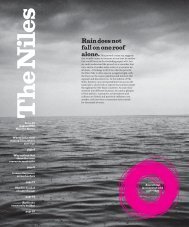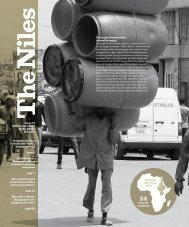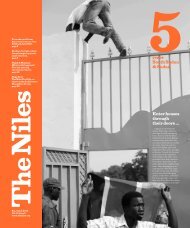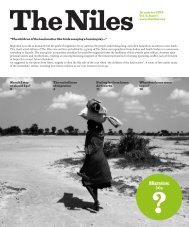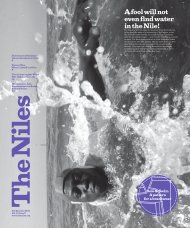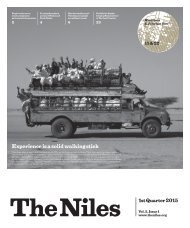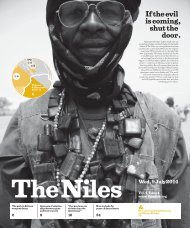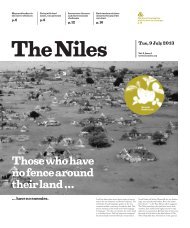When deeds speak, words are nothing
Speaking about sustainable development is easy. Acting sustainably is another matter. And now the evidence is unequivocal: Mankind’s impact on nature is causing the climate to change rapidly and drastically, threatening the environment and the very resources we need to survive. Aware that humanity is careening close to the edge, The Niles correspondents set out to explore where and how people in the Nile Basin region rethink. So much of their findings for now: We are an endlessly innovative species. Cooperation is our superpower. When deeds speak, words are nothing.
Speaking about sustainable development is easy. Acting sustainably is another matter. And now the evidence is unequivocal: Mankind’s impact on nature is causing the climate to change rapidly and drastically, threatening the environment and the very resources we need to survive. Aware that humanity is careening close to the edge, The Niles correspondents set out to explore where and how people in the Nile Basin region rethink. So much of their findings for now: We are an endlessly innovative species. Cooperation is our superpower. When deeds speak, words are nothing.
You also want an ePaper? Increase the reach of your titles
YUMPU automatically turns print PDFs into web optimized ePapers that Google loves.
“Seeing them
adopt reliable
and sustainable
solutions is
genuinely
awe-inspiring.”
At around 7-8 a.m., women
from the village dry the Lake
Victoria sardines before taking
the fish to the market.
It is the end of the fishing night,
and the fishermen are ready to
go home and rest.
Nyakandito, a fishmonger from
the island, carries the fresh Lake
Victoria sardines to be dried
before taking them to the market.
The communities living in Rusinga Island
have always depended on fishing and will
continue to rely on it in the future. But impacts
of climate change, such as increased water
levels of the lake, increases in temperature and
changes in rainfall patterns – combined with
overfishing and ongoing pollution of the lake
– significantly affect the fish populations. Most
of the freshwater fish species native to Lake
Victoria are endangered, critically endangered,
or extinct, according to the International Union
for Conservation of Nature (IUCN).
Climate change also impacts the health
of the communities, as warmer temperatures
and higher rainfall increase habitat suitability
for insects and the transmission of vector-borne
diseases such as malaria.
Taking climate action
United Nations Food and Agriculture Organisation
(FAO) Climate Smart Agriculture
sourcebook, is to enable the sector, where
possible, to contribute to the mitigation of
greenhouse gas emissions during the harvest
and production stages and throughout the
entire value chain.
The fishermen on Rusinga Island are taking
climate action and being part of the greater
efforts in driving the global climate agenda
in Africa. More than 90 percent of African countries
have ratified the Paris Agreement, with
many committing to transitioning to green
energy within a relatively short time frame.
Our communities face the brunt of climate
change, and seeing them adopt reliable and
sustainable solutions is genuinely awe-inspiring.
What is your community doing to mitigate
climate change? Look around, and you might
find an answer in the most unusual of ways.
One of the objectives of climate-smart
fisheries and aquaculture, suggested in the
[This is an abridged version of an in-depth
report published by InfoNile.]
33









